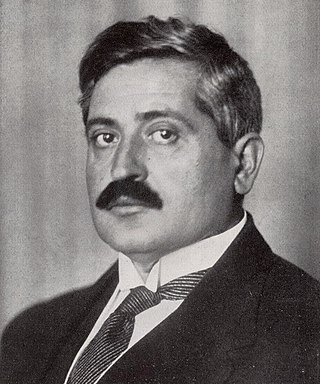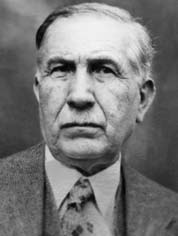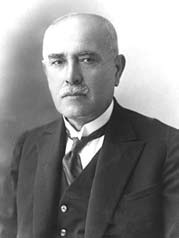Related Research Articles

Mehmed Talaat, commonly known as Talaat Pasha or Talat Pasha, was an Ottoman politician and convicted war criminal who served as the de facto leader of the Ottoman Empire from 1913 to 1918. Talaat Pasha was chairman of the Union and Progress Party, which operated a one-party dictatorship in the Empire; during World War I he became Grand Vizier. He was one of the perpetrators of the Armenian genocide and other ethnic cleansings during his time as Minister of Interior Affairs.

Soghomon Tehlirian was an Armenian revolutionary and soldier who assassinated Talaat Pasha, the former Grand Vizier of the Ottoman Empire, in Berlin on March 15, 1921. He was entrusted to carry out the assassination after having earlier killed Harutian Mgrditichian, who had worked for the Ottoman secret police and helped compile the list of Armenian intellectuals who were deported on April 24, 1915.
The Three Pashas also known as the Young Turk triumvirate or CUP triumvirate consisted of Mehmed Talaat Pasha (1874–1921), the Grand Vizier and Minister of the Interior; Ismail Enver Pasha (1881–1922), the Minister of War; and Ahmed Djemal Pasha (1872–1922), the Minister of the Navy, who effectively ruled the Ottoman Empire after the 1913 Ottoman coup d'état. According to historian Hans-Lukas Kieser, Talaat's power increased over time and eclipsed the others after 1913–1914.
Djevdet Bey or Djevdet Tahir Belbez was an Ottoman Albanian governor of the Van vilayet of the Ottoman Empire during World War I and the Siege of Van. He is considered responsible for the massacres of Armenians in and around Van. Clarence Ussher, a witness to these events, reported that 55,000 Armenians were subsequently killed. Djevdet is also considered responsible for massacres of Assyrians in the same region.

Ottoman labour battalions was a form of unfree labour in the late Ottoman Empire. The term is associated with the disarmament and murder of Ottoman Armenian soldiers during World War I, of Ottoman Greeks during the Greek genocide in the Ottoman Empire and also during the Turkish War of Independence.

Mehmed Reshid was an Ottoman physician, official of the Committee of Union and Progress, and governor of the Diyarbekir Vilayet (province) of the Ottoman Empire during World War I. He is known for organizing the 1915 genocide of the Armenian and Assyrian communities of Diyarbekir, in which between 144,000 and 157,000 Armenians, Assyrians, and other Christians were killed. During the Allied occupation of Istanbul, Reshid was arrested and his roles in the massacres were exposed. He later escaped from prison, but committed suicide after being cornered by local authorities.

The Armenian reforms, also known as the Yeniköy accord, was a reform plan devised by the European powers between 1912 and 1914 that envisaged the creation of two provinces in Ottoman Armenia placed under the supervision of two European inspectors general, who would be appointed to oversee matters related to the Armenian issues. The inspectors general would hold the highest position in the six eastern vilayets (provinces), where the bulk of the Armenian population lived, and would reside at their respective posts in Erzurum and Van. The reform package was signed into law on February 8, 1914, though it was ultimately abolished on December 16, 1914, several weeks after Ottoman entry into World War I.
{{Use dmy dates|date=February 2024}

The Turkish History Thesis is a Turkish ultranationalist, pseudohistoric thesis which posited the belief that the Turks moved from their ancestral homeland in Central Asia and migrated to China, India, the Balkans, the Middle East, and Northern Africa in several waves, populating the areas which they had moved to and bringing civilization to their native inhabitants. The theory was developed within the context of pre-Nazi scientific racism, classifying the Turks as an "Alpine subgroup" of the Caucasian race. The intent of the theory was a rejection of Western European assertions that the Turks belonged to the "yellow or mongol" race. Mustafa Kemal Atatürk took a personal interest in the subject after he was shown a French language book that claimed Turks "belonged to the yellow race" and were a "secondaire" people.

Talaat Pasha: Father of Modern Turkey, Architect of Genocide is a 2018 academic book by Hans-Lukas Kieser, published by Princeton University Press. It is a biography of Talaat Pasha. As of 2018 there had been no recent biographies of Talaat, nor of Enver Pasha, in western European languages. The book discusses the author's thesis that Talaat was co-Father of the Nation to modern Turkey along with Mustafa Kemal Atatürk, as well as Talaat's rule and significance.
Ahmet Faik Erner (1879–1967) was an Ottoman Turkish bureaucrat and a member of the Committee for Union and Progress (CUP).
Le Jeune Turc was a French language pro-CUP Zionist newspaper published in the late Ottoman Empire. It was one of two leading Zionist publications in Istanbul. The other one was L'Aurore which was also published in French. However, the circulation of Le Jeune Turc was much higher than that of L'Aurore, 15,000 copies and 1,500 copies, respectively.
Emmanouil Emmanouilidis was an Ottoman Greek representative for the Committee of Union and Progress during the Second Constitutional Era. He was born in 1867. He served at the Parliament from Izmir and was one of the deputies who criticized the press law of 1915. He died in 1943.
National economy is the economic plan, essentially kleptocratic, envisioned by Ziya Gökalp and carried out by successive Ottoman and Turkish governments, which involved the systematic dispossession of native Christian upper-classes and their replacement by Muslim Turks, in addition to large-scale confiscation and redistribution of Christian-owned property. Türk Yurdu announced 1915 as the starting year of the national economy. To Emil Ludwig, Talaat Pasha mentioned that the loss of the Armenian workforce would damage the economy for a short while, but that Turks would step in their positions and replace the Armenians soon.

On 15 March 1921, Armenian student Soghomon Tehlirian assassinated Talaat Pasha—former grand vizier of the Ottoman Empire and the main architect of the Armenian genocide—in Berlin. At his trial, Tehlirian argued, "I have killed a man, but I am not a murderer"; the jury acquitted him.

Ali Münif Yeğenağa was an Ottoman politician and government minister, who played an active role in the Young Turk Revolution, he also served as the Minister of Education of the Ottoman Empire in 1918. He was furthermore a close friend of Talaat Pasha and played a prominent role in the Armenian genocide.

Differing views of what caused the Armenian genocide include explanations focusing on nationalism, religion, and wartime radicalization and continue to be debated among scholars. In the twenty-first century, focus has shifted to multicausal explanations. Most historians agree that the genocide was not premeditated before World War I, but the role of contingency, ideology, and long-term structural factors in causing the genocide continues to be discussed.

The state funeral of Talaat Pasha, former Grand Vizier of the Ottoman Empire and one of the chief architects of the Armenian genocide, took place at the Monument of Liberty in Istanbul, Turkey, on 25 February 1943. At the request of the office of the prime minister of Turkey, Şükrü Saracoğlu, Talaat's remains were disinterred and transported to Turkey. The funeral was attended by Prime Minister Saracoğlu, German ambassador to Turkey Franz von Papen, and Turkish journalist Ahmet Emin Yalman. With this gesture, Adolf Hitler hoped to secure Turkish support for the Axis in World War II. Hüseyin Cahit Yalçın gave the funeral oration as Talaat was buried at the monument, originally dedicated to those who lost their lives preventing the 1909 Ottoman countercoup.

The Said Halim Pasha cabinet was headed by Grand Vizier Said Halim Pasha. It was formed on 17 June 1913 after Mahmud Shevket Pasha's assassination. It soon came to be wholly controlled by the Union and Progress Party. With the exception of Mardikyan Bey being the only Christian, everyone in cabinet was Muslim, with Said Halim Pasha and his brother Abbas Pasha Arabs and the rest Turks.

Below is an outline of Wikipedia articles related to the Greek genocide and closely associated events and explanatory articles. The topical outline is accompanied by a chronological outline of events. References are provided for background and overview.
References
- 1 2 "Staff Profile". www.newcastle.edu.au. 2015-01-16. Retrieved 2020-11-05.
- 1 2 3 "Prof. Dr. Hans-Lukas Kieser". www.hist.uzh.ch (in German). Retrieved 2020-11-05.
- ↑ "Staff Profile". www.newcastle.edu.au. 2015-01-16. Retrieved 2020-09-09.
- 1 2 "Hans-Lukas Kieser". boghossianprize.am. Retrieved 2020-11-05.
- ↑ "Swiss historian, Agos' Armenian section's editor and a group of distinguished figures receive Presidential Awards". armenpress.am. Retrieved 2020-11-05.
- ↑ Kieser, Hans-Lukas (2011-03-14). Hans-Lukas Kieser. ISBN 9781439902233.
- ↑ Badem, Candan (2019). "Review of Talaat Pasha: Father of Modern Turkey, Architect of Genocide". Journal of the Ottoman and Turkish Studies Association. 6 (1): 237–239. doi:10.2979/jottturstuass.6.1.13. ISSN 2376-0699. JSTOR 10.2979/jottturstuass.6.1.13.
- ↑ Türesay, Özgür (2019). "Talaat Pasha. Father of Modern Turkey, Architect of Genocide, written by Hans-Lukas Kieser". Studia Islamica. 114 (1): 83–89. doi:10.1163/19585705-12341392. ISSN 1958-5705. S2CID 171606243.
- ↑ Mangold-Will, Sabine (2019). "Biography and the Myth of Leadership in History: Talaat Pasha Father of modern Turkey, architect of genocide, by Hans-Lukas Kieser, Princeton, Princeton University Press, 2018, 552 pp., USD$39.95 (hardback), ISBN 9780691157627". Journal of Genocide Research. 21 (4): 556–561. doi:10.1080/14623528.2019.1613829. S2CID 182427725.
- ↑ Kurt, Ümit (2019). "Father of Modern Turkey or Father of Ittihadists?: Talaat Pasha father of modern Turkey, architect of genocide, by Hans-Lukas Kieser, Princeton, Princeton University Press, 2018, 552 pp., USD$39.95 (hardcover), ISBN: 9780691157627". Journal of Genocide Research. 21 (4): 545–550. doi:10.1080/14623528.2019.1613819. S2CID 182250427.
- ↑ Usitalo, Steven A (2019). "Talaat Pasha: Father of Modern Turkey, Architect of Genocide Hans-Lukas Kieser". Holocaust and Genocide Studies. 33 (3): 451–453. doi:10.1093/hgs/dcz057.
- ↑ Melson, Robert (2018). "Review of Talaat Pasha: Father of Modern Turkey, Architect of Genocide". Genocide Studies International. 12 (2): 253–256. doi:10.3138/gsi.12.2.08. ISSN 2291-1847. JSTOR 26986104. S2CID 193103555.
- ↑ Maksudyan, Nazan (2019). ""This Is a Man's World?": On Fathers and Architects: Talaat Pasha father of modern Turkey, architect of genocide, by Hans-Lukas Kieser, Princeton, Princeton University Press, 2018, 552 pp., US$39.95 (hardcover), ISBN: 9780691157627". Journal of Genocide Research. 21 (4): 540–544. doi:10.1080/14623528.2019.1613816. S2CID 181910618.
- ↑ Üngör, Uğur Ümit (2019). "A Multi-Dimensional Contribution to Mass Violence Research Hans Lukas Kieser's Talaat Pasha: Talaat Pasha father of modern Turkey, architect of genocide, by Hans-Lukas Kieser, Princeton, Princeton University Press, 2018, 552 pp., USD$39.95 (hardcover), ISBN: 9780691157627". Journal of Genocide Research. 21 (4): 551–555. doi:10.1080/14623528.2019.1613825. S2CID 182213935.
- ↑ Köse, Yavuz (2021). "Hans-Lukas Kieser. Talât Pascha. Gründer der modernen Türkei und Architekt des Völkermords an den Armeniern. Eine politische Biografie. Aus dem Englischen übersetzt von Beat Rüegger. Zürich: Chronos Verlag. 2021. 439 Seiten. ISBN-13: 9783034015974". Diyâr. 2: 150–154. doi:10.5771/2625-9842-2021-1-150. S2CID 237963481.
- ↑ Kieser, Hans-Lukas; Anderson, Margaret Lavinia; Bayraktar, Seyhan; Schmutz, Thomas (2019-07-11). The End of the Ottomans: The Genocide of 1915 and the Politics of Turkish Nationalism. Bloomsbury Academic. ISBN 978-1788312417.